- November 2022
- October 2022
- September 2022
- August 2022
- July 2022
- June 2022
- May 2022
- April 2022
- March 2022
- February 2022
- January 2022
- December 2021
- November 2021
- October 2021
- September 2021
- August 2021
- July 2021
- June 2021
- May 2021
- April 2021
- March 2021
- February 2021
- January 2021
- December 2020
- November 2020
- October 2020
- September 2020
- August 2020
- July 2020
- June 2020
- May 2020
- April 2020
- March 2020
- February 2020
- January 2020
- December 2019
- November 2019
- October 2019
- September 2019
- August 2019
- July 2019
- June 2019
- May 2019
- April 2019
- March 2019
- February 2019
- January 2019
- December 2018
- November 2018
- October 2018
- September 2018
- August 2018
- July 2018
- June 2018
- May 2018
- April 2018
- March 2018
- February 2018
- January 2018
- December 2017
- November 2017
- October 2017
- September 2017
- August 2017
- July 2017
- June 2017
- May 2017
- April 2017
- March 2017
- February 2017
- January 2017
- December 2016
- November 2016
- October 2016
- September 2016
- August 2016
- July 2016
- June 2016
- May 2016
- April 2016
- March 2016
- February 2016
- January 2016
- December 2015
- November 2015
- October 2015
- September 2015
- August 2015
- July 2015
- June 2015
- May 2015
- April 2015
- March 2015
- February 2015
- January 2015
- December 2014
- November 2014
- October 2014
- September 2014
- August 2014
- July 2014
- June 2014
- May 2014
- April 2014
- March 2014
- February 2014
- January 2014
HUD Releases Income Limits for Fiscal Year 2022
CARH’S BROADCAST E-MAIL – Regulatory Alert
On April 18th, the Department of Housing and Urban Development (HUD) released Fiscal Year (FY) 2022 Income Limits. These income limits were effective on April 18, 2022.
Income limits are set by HUD to determine the eligibility of applicants for HUD’s assisted housing programs. Section 8 Fair Market Rent (FMR) area definitions are used to develop median family income estimates for each metropolitan area and non-metropolitan county. HUD income limits are calculated for every FMR area with adjustments for family size and for areas that have unusually high or low income-to-housing-cost relationships.
Low-income families are defined as families whose incomes do not exceed 80 percent of the median family income for the area. Very low-income families are defined as families whose incomes do not exceed 50 percent of the median family income for the area. Income limits for non-metropolitan areas may not be less than limits based on the State non-metropolitan median family income level.
The FY 2022 Multifamily Tax Subsidy Projects (MTSP) Income Limits were also announced and go into effect today. MTSP Income Limits were developed to meet the requirements established by the Housing and Economic Recovery Act of 2008 (P.L. 110-289). The MTSP Income Limits are used to determine qualification levels as well as set maximum rental rates for properties funded with tax credits authorized under section 42 of the Internal Revenue Code (the Code) and properties financed with tax exempt housing bonds issued to provide qualified residential rental development under section 142 of the Code. (Note: The limits identified in the MTSP Income Limits tables and MTSP Documentation system as “HERA Special” Income Limits are only for use by properties in service in 2007 or 2008.)
For other news and information affecting the affordable rural housing industry, please visit the Newsroom on CARH’s website, www.carh.org.





